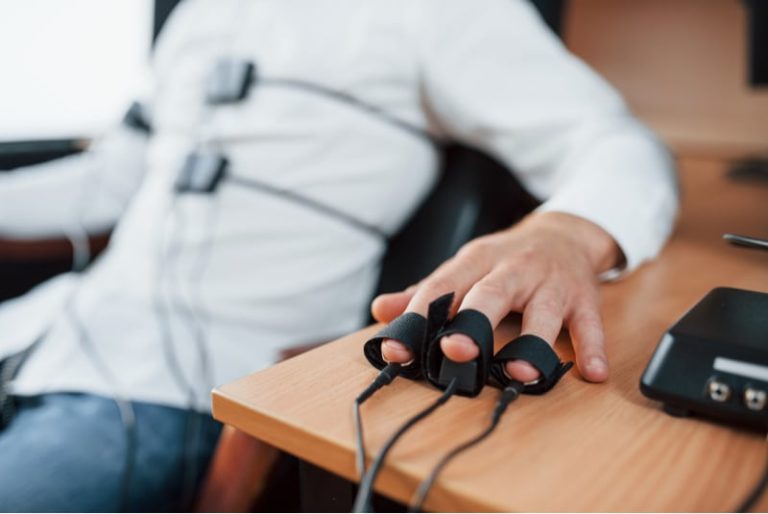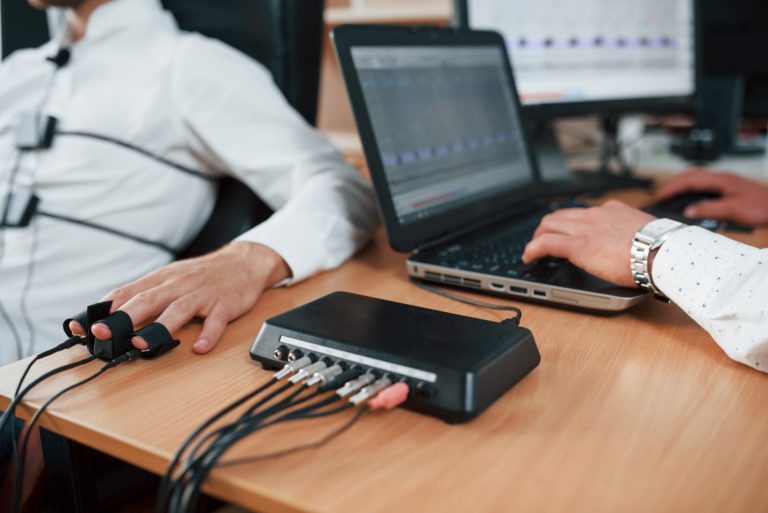
Know Why You Are Taking A Polygraph Exam
Understand exactly why you are taking a polygraph exam. Polygraph exams are voluntarily taken and therefore you cannot be forced to take one. Be clear in your own mind why you are taking the exam and that you are going to answer all questions 100% truthfully. This includes all the questions asked by the polygraph examiner prior to the actual exam. For example, if you are taking an exam as part of a Pre-employment Investigation, understand that everything you say to the polygraph examiner is for the sole purpose of investigating you as a potential candidate for employment. Similarly, if you are being asked to take a polygraph exam under suspicion of theft or inappropriate behavior, be clear in your own mind of your innocence and good character.
Get A Good Night’s Sleep


Dress To Impress
Although what you wear does not assist in the actual results of the polygraph exam, it is nevertheless important. Wearing shorts, flip flops and a sweatshirt may send the wrong impression to the polygraph examiner as to how seriously you are taking the exam. Like everyone, examiners are subject to first impressions. The more professional and conscientious an examinee dresses subconsciously conveys how serious the examinee views the polygraph process and results. After all, it is the polygraph examiner that initiates the interview questions and if a poor impression is immediately given the examiner may ask more difficult and probing questions. Again, know why you are taking the polygraph exam and dress appropriately.
Meeting Your Polygraph Examiner
Polygraph examiners come in different shapes, sizes, ages and backgrounds. Do not judge the experience or intelligence of your examiner by the first impression. Often polygraph examiners have enhanced experience in interview techniques and frequently have extensive experience in law enforcement. The examiner will do their best to put you at ease and help you to relax. They may joke and act as though the polygraph exam is “no big deal.” A relaxed examinee is more likely to freely expand on answers, tell stories and engage in casual conversation with the examiner. The examiner is not trying to trick you but rather wants you to feel comfortable. Relax but do not forget why you are having the exam. It is a big deal. The examiner will undoubtedly request cell phones be silenced. Additionally, a Consent to Polygraph Exam and Waiver of Liability will be presented and reviewed for the examinee to sign.

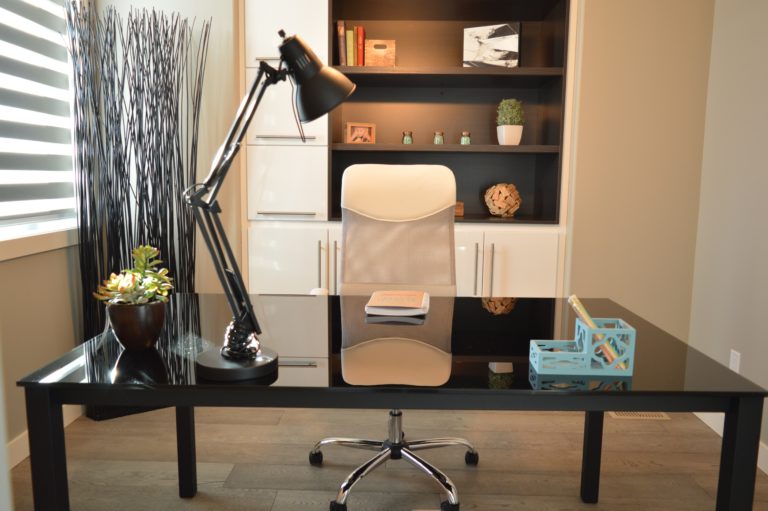
Acclimate To The Room
The exam room may be a regular size office or a very small room or something else completely. The size or appearance of the room should in no way affect your mood or opinion of the procedure. Whether the space is small and undecorated or large with a number of framed certificates and awards it should make no difference to your level of confidence in the examiner or of your own state of mind. Do not be intimidated by an impressive office and do not dismiss the effectiveness of the examiner with a small sparse one. From the moment you enter the room until you exit after the exam, you are being recorded both audibly and visually. Enter the room, look around briefly, sit down and block the room from your mind. Your surroundings have nothing to do with your results. No one other than the examinee and examiner is allowed in the room. No lawyers, no spouses, no friends. The only allowed exception is a polygraph examiner trainee.
Pre-exam Interview

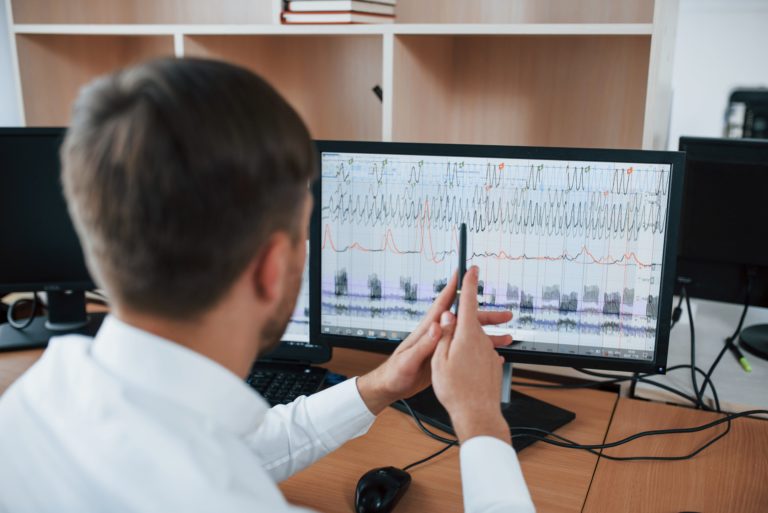
Know The Polygraph Equipment
Polygraph equipment has come a long way from the ink-filled prongs seen on television. The newest equipment stems from a small box about the size of a man’s shoe. Several cords run from the box; one to a computer or laptop, one to a sensor pad placed on the examinee’s seat, and four are hooked up to the examinee. Sometimes two sticky sensors are placed on the palm of your hand. It feels like a lot of cords but do not be intimidated. The cords hooked to the examinee simply record breathing, heart rate, and perspiration. It is through the recording of these physical measurements that charts appear on the computer screen and are subsequently scored by the examiner. Relax, breathe normally and give truthful answers.
Taking The Exam
The actual exam will take approximately twenty minutes. After being hooked up to the sensors and the blood pressure cuff set, a short test is given to acquaint you with the equipment and the examiner to your physiological reactions. You will be asked to answer YES or NO, depending on your answer. Afterwards, the actual polygraph examination will be conducted under the same conditions and depending on the type of exam given, may be repeated three times. The questions asked will be the exact questions agreed upon in the pre-interview. No surprise questions will be given.
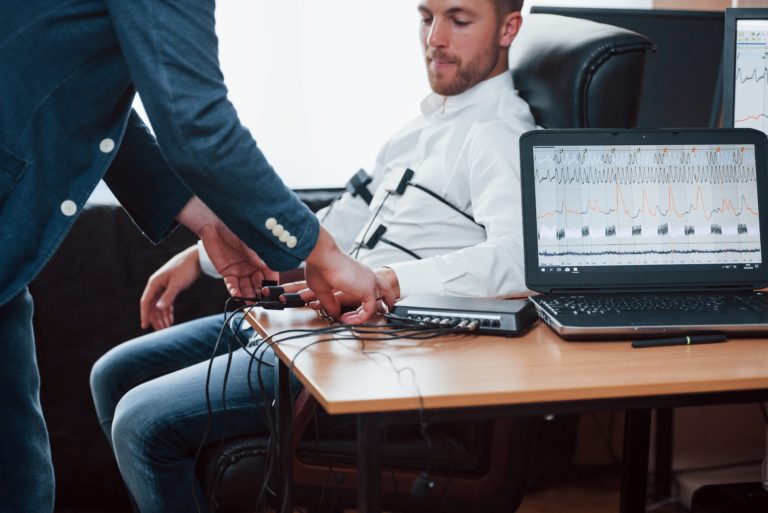

Post-exam Interview
After the exam, the examiner will typically ask you to step out of the room so he can score the exam. Once scored, it is common for the examiner to discuss the exam results and any concerns regarding particular questions. It may be suggested that one or more questions be repeated or another set of questions given.
Test Result
Test results are typically scored as Deceptive (DI), Not Deceptive (NDI) or Inconclusive for evidentiary testing and Significant Response (SR) or Non-Significant Response (NSR) or Inconclusive for screening tests. for screening tests. Purposeful Non-cooperation (PNC) is used when the examinee’s compliance with the instructions necessary to conduct a valid examination is non-cooperative. The outcome of the exam is told to the examinee but the written report is typically provided to the requesting party or agency. Polygraph exam results of Infidelity issues are provided at the time of the exam but the report is typically sent to the therapist or e-mailed to the of the individual requesting the examination.
